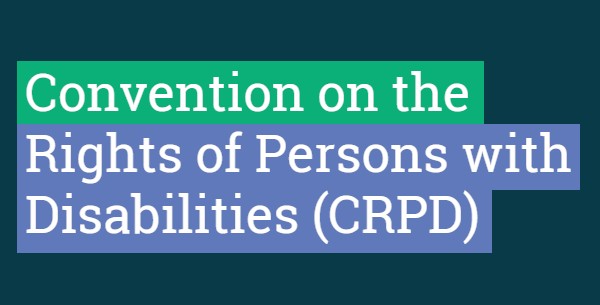|
 |
New report on the state of disabled people's rights in the UK
This month we published our latest report for the United Nations on the Convention on the Rights of Persons with Disabilities (CRPD).
Our report finds that disabled people face daily discrimination in the UK, with the situation continuing to worsen, particularly alongside cost-of-living pressures. We are concerned by the continuing failure of the UK and Welsh governments to make necessary reforms so that disabled people no longer face higher risks of poverty, abuse and poor health.
Produced in collaboration with the other equality bodies and national human rights institutions (NHRIs) in Britain and Northern Ireland, our new report follows the UN Committee on the Rights of Persons with Disabilities’ inquiry into the state of rights for disabled people in the UK.
The inquiry’s findings were published in 2016 alongside a list of 11 recommendations for the UK government to protect the rights of disabled people. This latest report assesses the extent to which the recommendations have been implemented.
Disabled people must be treated with dignity, respect, and fairness. The recommendations made years ago must be addressed so that the lives of disabled people can improve. | | | Read our report on the state of disabled people's rights in the UK | |
|
|
Our report on the future of work
This month we published a report on how workplace trends might impact different protected characteristics.
Our report, ‘The future of work: protected characteristics in a changing workplace’, explores the major drivers of changes in the world of work and the equality and human rights implications for groups with different protected characteristics in Britain.
We commissioned the Learning and Work Institute (L&W) to provide this research, who found that flexible working, the gig economy, and the use of AI, are increasing faster for individuals with certain protected characteristics.
Work is becoming more flexible, digital and automated. Whilst these changes can widen opportunities, adverse effects from these trends could affect some groups more than others.
These trends could have a significant effect on equality in the labour market for older and younger people, ethnic minorities, disabled people and women.
| | | Read our Future of Work Report | | | Hear from our CEO and the L&WI Chief Executice | |
|
|
 |
New podcast: Equality and AI: Promoting and Protecting Equality in the Public Sector
In collaboration with Scottish AI Alliance we have produced a podcast which explores the impacts of Artificial Intelligence (AI) systems, how public bodies are embedding equality and the barriers they face.
Our Senior Associate for Scotland Compliance matters, Katharine Weatherhead, discusses in the podcast how AI technologies affect people with protected characteristics. “The lens of equality law helps alert us to both the negative and positive effects of AI on particular groups in a specific context.”
| |
|
|
|
Former contractor engaged by the Probation Service wins racial discrimination case
A former contractor engaged by HM Prison and Probation Service (HMPPS) has received a financial settlement following allegations of racial discrimination at the Probation Service offices in Reading.
While working for the service, Mr Odain was subjected to multiple incidents of racial discrimination and harassment by another contractor in 2019. These included the person making monkey chants towards Mr Odain while he was talking to colleagues.
Mr Odain reported the racist behaviour to managers at the Probation Service but, following a flawed investigation, the offender was allowed to return to work in the same office, leaving Mr Odain with no choice but to leave the job he enjoyed.
We supported Mr Ordain’s case through our legal support scheme and more than three years after Mr Odain’s initial complaint, HMPPS settled the case.
| | | Read about Mr Ordain's racial discrimination case | |
|
|
 |
Our consultation response to the Department for Health and Social Care
The Department of Health and Social Care (DHSC) has developed an Adult Social Care Data Roadmap to transform the use of social care data in England and Wales.
We have submitted a response to this consultation to ensure equality is central to future data collection.
Collecting data on the protected characteristics of people who draw on care, and those who make complaints or challenge local authority decisions regarding their social care, can help local authorities understand whether the care needs of different groups of people living in their local area are being met.
Better data collection can also support the improvement of systems and services.
In line with the Public Sector Equality Duty (PSED) the UK and Welsh governments should work with local authorities to improve the collection, analysis and reporting of the equality data to identify and address the poor outcomes experienced by people who share protected characteristics. | | | Read our consultation response to the Department of Health and Social Care | |
|
|
Memorandum of Understanding with the Local Government and Social Care Ombudsman
This month, we signed a Memorandum of Understanding (MoU) with the Local Government and Social Care Ombudsman (LGSCO).
The LGSCO are responsible for investigating individual complaints about local councils, adult social care providers including care homes and home care agencies, and some other public services too.
This MoU will strengthen our collaboration with the LGSCO and help us to continue to work effectively together to ensure that people who receive social care are treated not only with proper dignity and respect, but in line with the UK’s strong equality and human rights law.
In February this year, we worked with the LGSCO to publish findings from our inquiry into the experiences of social care users and carers who challenged decisions made by local authorities in England and Wales. We found a system failing those who need it. Instead of upholding people’s rights, complicated council processes deterred people from seeking help.
We look forward to developing our work with the LGSCO to ensure the ongoing compliance by local councils and care providers with these protections. | | | Read our CEO's blog on our MoU with the LGSCO | |
|
|
 |
Visiting Rights in Care Homes, Hospitals and Hospices
We have responded to a consultation by the UK Government Department of Health and Social Care on protecting visiting as a fundamental standard through secondary legislation. This would mean that no one is denied reasonable access to visitors while they are resident in a care home, or a patient in hospital or a hospice.
While we welcome this proposal, we recommend that any exceptions to the new fundamental standard are only applied where it is necessary and proportionate to do so. We also recommend that the Government consider how visiting rights can be improved in supported living settings.
The facilitation of visiting is vital to supporting residents’ and inpatients’ rights to private and family life. It can have a significant positive impact on wellbeing too, including for family members.
As Britain’s equality regulator and National Human Rights Institution, it is our duty to advise government and Parliament on matters relating to equality and human rights. We are committed to ensuring the rights of residents’ and inpatients’ are upheld.
| | | Read our consultation response on visiting rights | |
|
|
Concern over the treatment of inpatients at the Edenfield Centre
We have written to the Greater Manchester Mental Health Trust (GMMHT) after they were rated ‘inadequate’ by the Care Quality Commission in July 2023.n September last year, we wrote to GMMHT regarding our concerns about the treatment of inpatients and potential human rights breaches at the Edenfield Centre, in Prestwich.
We received reassurance from the Trust that immediate action was being taken to protect patients’ human rights. Based on the information provided, we decided not to take any further action at that point to allow time for the measures to be implemented.
We wrote again to the GMHHT this month to seek assurance that the changes implemented by the Trust in 2022 have been effective in protecting patients’ rights in Edenfield, particularly those with learning disabilities and autism, will be protected in future.
As Britain’s equality regulator and National Human Rights Institution, it is our duty to enforce equality laws and defend human rights, taking appropriate action where necessary.
All patients must be treated with respect and dignity. The information we receive in response to our letter will determine any future regulatory action we may need to take. | | | Read our statement on the treatment of patients at the Edenfield Centre | |
|
|
 |
Settlement claim in Fuller’s Brewery sexual harassment case
A former employee who suffered repeated incidents of sexual harassment while working as a kitchen assistant and waitress at a Fuller’s pub has successfully reached an agreed settlement for her legal case.
The female worker was subjected to homophobic and misogynistic comments including remarks about her appearance and her partner over an extended period of time at work.
The claimant alleged that when she complained about the comments she was subjected to further derogatory behaviour and comments.
As part of the settlement, Fuller’s has apologised to the employee and agreed to implement mandatory sexual harassment training for kitchen and front of house staff across their national network of pubs.
Following our intervention thousands of workers at Fuller’s will receive training to prevent sexual harassment.
All employers must take reasonable steps to protect their staff from harassment under the Equality Act 2010. | | | Read our statement on the Fuller's Brewey case | |
|
|